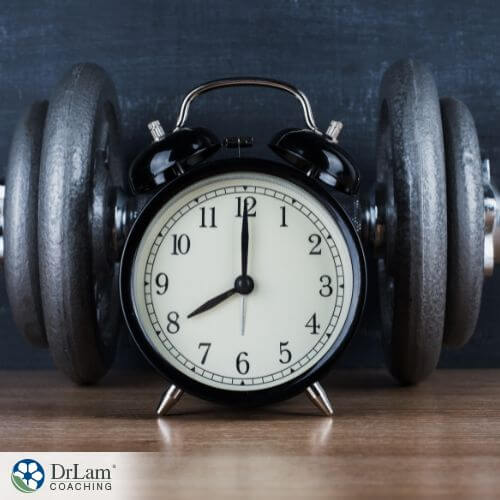 It's well-known that exercise has multiple benefits to your health. It's a crucial part of a healthy lifestyle and for some is an enjoyable activity. However, with busy lives, multiple commitments, and responsibilities, exercise can often be pushed to the bottom of the to-do list. With this in mind, this article will investigate the best time of day to exercise and how you can reap the most from your exercise session.
It's well-known that exercise has multiple benefits to your health. It's a crucial part of a healthy lifestyle and for some is an enjoyable activity. However, with busy lives, multiple commitments, and responsibilities, exercise can often be pushed to the bottom of the to-do list. With this in mind, this article will investigate the best time of day to exercise and how you can reap the most from your exercise session.
Generally, when looking at individuals who exercise, it is split into two groups. One group prefers to exercise early in the morning, and the other group prefers to exercise in the afternoon/early evening. There are many reasons why a specific time might work better for you. And studies have also connected some benefits and drawbacks to these different times of day to exercise.
It's a well-known saying that the early bird gets the worm, and these early birds also like to get their exercise done early in the morning, leaving the rest of the day open. One benefit to this is that it's off your to-do list and gives you the rest of the day to focus on your other responsibilities.
One study researching the effect of exercising in the morning in young adults found that more weight was lost, compared to the group doing the same exercise later in the day (1). Multiple factors could have contributed to this change between the two groups, however. One factor is that individuals who start their day with exercise may be more likely to be active throughout the day, increasing all-day weight loss.
Another benefit of exercising in the morning is that exercise releases feel-good hormones, also known as endorphins, earlier in the day. This may reduce the urge to reach for certain types of foods, like those high in fats and sugar, that also release these feel-good hormones. It helps lower stress and control cravings all day long. Exercising in the evening may not assist with this, as you only receive the endorphins later in the day.
However, one drawback to exercising in the morning is that it does require you to wake up earlier than usual and may contribute to feelings of tiredness throughout the day.
There may also benefits to exercising later in the day. One study found that strength is greater in the late afternoon/early evening, resulting in potentially more energy burned during exercise, which may contribute towards meeting weight loss goals (2). The markers of strength used in this article were jump height and hand grip strength.
Additionally, your reaction time may be enhanced, which may benefit you in high-intensity interval training (HIIT) as well as speedwork.
During the day, your heart rate as well as blood pressure starts to decrease and this may contribute to a lower risk of injuries if you choose this time of day to exercise.
Aside from not getting endorphins to suppress appetite throughout the day, another potential drawback to exercising later in the day is that it may disrupt your sleep. However, this depends largely on the individual.
 Exercising both in the morning as well as late in the day both have benefits as well as drawbacks. Choosing the best time of day to exercise depends on the benefits as well as your preferences and schedule.
Exercising both in the morning as well as late in the day both have benefits as well as drawbacks. Choosing the best time of day to exercise depends on the benefits as well as your preferences and schedule.
If you are focusing on strength work, late afternoon may be a better option. If you are focusing on energy and weight loss, mornings may be the better option.
However, both times are beneficial, so what is important is just exercising on a regular basis in general.
If you are new to exercising you can always try working out at different times for a week or two and see what works best for your schedule and your body.
Another question that often comes up is whether you should exercise before or after breakfast or dinner.
There is research that suggests that exercising on an empty stomach may improve the amount of fat you burn, thus improving weight loss. However, not eating before a meal may lead you to feeling weak and reducing the intensity of your exercise which may then hinder the amount of fat you burn.
Thus, more research is necessary. This aspect of nutrition also depends on the individual as some individuals prefer to not eat beforehand and some prefer to work out after having a meal or small snack.
The American College of Sports Medicine recommends a minimum of 150 minutes of exercise per week. However, some will find that over 250 minutes per week may be necessary to maintain weight loss. To get the best results, it's important to remember that nutrition goes hand in hand with exercise (3). Following a nutritional program along with exercise will increase the chances of losing weight. Additionally, making sure to have a nutritious meal after an exercise session may help to build muscle, which may help to assist with burning fat.
If there are no nutritional changes made, the recommendation is 225-400 minutes of exercise per week. However, there is no guarantee that you will see changes in your weight (3).
If you are beginning your exercise journey, it's important to build up your fitness slowly and consistently. Going from zero to 150 minutes a week may be a lot for your body and may lead to injuries. To prevent this, start slowly and increase gradually until you reach the optimal ranges. This is especially true if you are under chronic stress or have been dealing with adrenal fatigue.
Losing weight is a common motivator to start exercising. However, changes in weight can be caused by many different factors including chronic stress. In response to stress your body utilizes the NeuroEndoMetabolic (NEM) Stress Response System. This system consists of six circuits of related organs to help support your body in dealing with stress. One way it manages stress is by your adrenal glands releasing cortisol, one of the main stress hormones.
 When stress becomes chronic, it can start to put pressure on this system. This can eventually deplete your adrenal glands of cortisol, and imbalances within this system can start to arise. This is known as Adrenal Fatigue Syndrome (AFS). AFS is the non-Addison's form of adrenal dysfunction, where the body's stress response cannot keep up with life's chronic stressors.
When stress becomes chronic, it can start to put pressure on this system. This can eventually deplete your adrenal glands of cortisol, and imbalances within this system can start to arise. This is known as Adrenal Fatigue Syndrome (AFS). AFS is the non-Addison's form of adrenal dysfunction, where the body's stress response cannot keep up with life's chronic stressors.
Symptoms of AFS depend on where the imbalance in the NEM system is occurring. One of the circuits is the Bioenergetics circuit. This circuit is responsible for maintaining your metabolism as well as blood sugar. In chronic stress, this circuit is not able to effectively manage metabolism and sugar levels. This can result in weight gain, sugar cravings, dizziness, and shakiness.
Exercise can come in handy here, helping to boost your metabolism and indirectly may assist with sugar cravings. However, whilst exercise is important, caution is also important. Exercise can also act as a stressor on the body and requires cortisol, the last thing your body needs with AFS. Thus, gentle exercise such as yoga or walking may be necessary until you have healed more.
Exercise has many benefits, and choosing the best time of day to exercise can play a role in helping your body reap those benefits. Choosing a time is personal and will depend on your health goals as well as your own schedule. According to some evidence, morning may work best for suppressing appetite, but evening may work better for building muscle and strength training.
In addition, the best results will likely come from consistency as well as starting slow and gradually increasing your exercise. If you are currently struggling with changes in your weight as well as cravings and weakness, chronic stress could play a role. If you would like assistance in determining this, you can contact the Dr. Lam team by clicking here for a free initial call.
Creasy S, et al. "Effect of Morning and Evening Exercise on Energy Balance: A Pilot Study." Nutrients, vol. 14, no. 4, 2022 Feb. pp. 816. https://www.ncbi.nlm.nih.gov/pmc/articles/PMC8877501/
Bruggisser F, et al. "Best Time of Day for Strength and Endurance Training to Improve Health and Performance? A Systematic Review with Meta-Analysis." Sports Med Open, vol. 9, no. 34, 2023 Dec. https://www.ncbi.nlm.nih.gov/pmc/articles/PMC10198889/
Balfour J and Boster J. "Physical Activity and Weight Loss Maintenance." StatPearls. Updated 2023 June. https://www.ncbi.nlm.nih.gov/books/NBK572051/
Exercise can help to manage stress. However, picking the best time of day to exercise can depend on the source of the stress. If you wake up with stress, exercising may help you to manage and process thoughts, potentially reducing stress. However, if your job is stressful, exercising afterward may be more beneficial.
